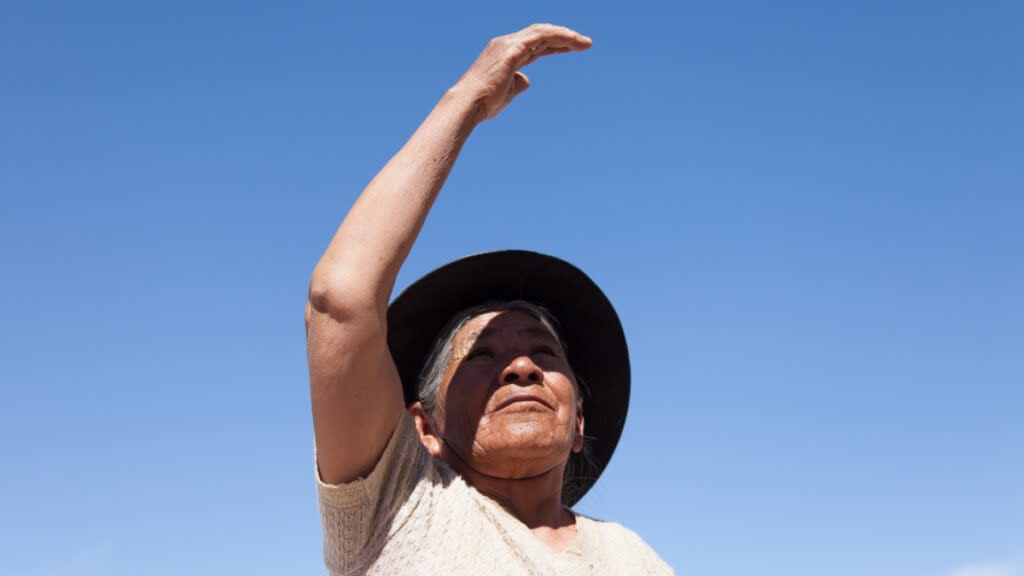‘Utama’ Review: Bolivia’s Oscar Entry Examines the End of a Way of Life

You hear “Utama” before you see it: the sounds of wind interrupted suddenly by chimes tolling, underlying a simple black and white title treatment. The sound ushers us into the spectacular opening frame, the image of a man standing on an arid landscape, facing a magnificent golden horizon glowing in the distance, teeming with dramatic clouds. It’s in this image and these sounds that one can find the entire thesis of “Utama,” in which a man faces a formidable unknown.
“Utama,” which means “our home” in Quechua, is the debut feature of photographer and cinematographer Alejandro Loayza Grisi, and is the official Bolivian selection for the Best International Film Academy Award after winning the World Cinema Dramatic Grand Jury Prize at the 2022 Sundance Film Festival. It is a spare and yet unsparing film, and a bold artistic statement from an emerging filmmaker.
Non-professional actors José Calcina and Luisa Quispe, who were cast when Grisi spotted them outside their home while location scouting, portray Virginio and Sisa, who live in the Bolivian highlands, leading a traditional and simple life in rhythm and relationship to the land. Virginio gets up to graze his herd of llamas every day, but Sisa is having to walk farther and farther to gather water. The rains have not come, and the wells have run dry. As their neighbors debate leaving, Virginio stubbornly refuses to go, despite a wracking cough.
Also Read:
Oscars International Race Hits 92 Entries, One Short of All-Time Record
His stubbornness bedevils their grandson, Clever (Santos Choque), who soon comes to visit, under the guise of spending time with them and helping out with daily chores. But Clever, whose hoodies and headphones are starkly juxtaposed against Virginio’s traditional hats and garb, has an ulterior motive: delivering the request that he’d like them to come move to the city, where there’s access to running water and health care and the perceived comforts of modernity. Virginio is hurt, resentful and upset at Clever’s message, revealing likely years of icy communication between himself and his son, Clever’s father.
One day, Virginio shares a story with Clever about the way that condors die, taking themselves to a mountain, folding their wings and simply falling when they feel they are no longer of use. In recounting this tale, it seems Virginio considers this an honorable way to go, and you almost wonder if the movie has given away its hand. But it’s not at all that simple: Virginio and the condor are in many ways the same; they just have different purposes, with Virginio’s not yet being revealed to him.
Also Read:
‘Nanny’ Wins Dramatic Grand Jury Prize at Sundance 2022
“Utama” derives its simple and natural beauty from the unique landscape of this high desert. Grisi and cinematographer Barbara Alvarez favor a locked-off camera and complex, carefully-crafted compositions that evolve into a storytelling motif as they are repeated. The frames are painted breathtakingly with color and light, capturing the landscape and the people within.
Calcina and Quispe could not be more perfectly cast as Virgino and Sisa, who are seemingly of the earth itself, the solid planes of their faces as much a part of this land as the mountains. They seem as rightfully placed as the condors that sail overhead, and the curious, quirky llamas, who are distinguished by the bright pink yarn tassels on their ears. They share a comfortable intimacy, and Calcina ultimately delivers an affecting and emotional performance.
Layered into the top note of the film’s soundtrack is Virginio’s labored but steady breath, intertwining the film with his own existence. It takes on a certain amount of suspense, as we wait for the breathing to stop, yet willing it to continue nevertheless, as he breathes life into the film itself.
Also Read:
The ‘Squid Game’ Effect: Overseas Producers Are Cashing in Amid the Foreign-Language Streaming Boom
This is a film about living in a harsh environment and, indeed, about climate change, though it never feels the need to state itself as such. It’s obvious, and in accepting that theme and the simple storytelling, one can get lost in the resonance of the metaphor and symbolism. Sisa crumbles dry earth in her hand, the same color of Virginio’s skin. He is of the earth, he is the earth, his gasping breaths and violent coughs representing a lost way of life, a lost planet, and the opportunity for a cycle to begin anew.
“Utama” is a stark story, starkly beautiful in its richness of restrained imagery. It offers a bleak message with a sliver of hope at the opportunity for something new to grow when something else stops breathing and withers away, returning to the earth itself, falling from the mountaintop.
“Utama” opens in NYC Nov. 4 and LA Nov. 11 via Kino Lorber.


